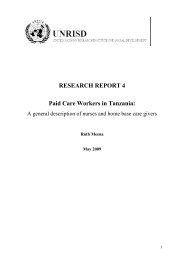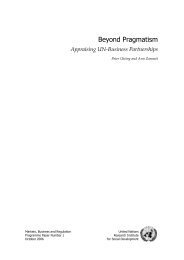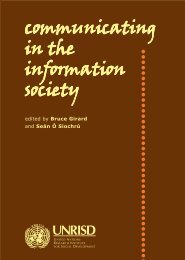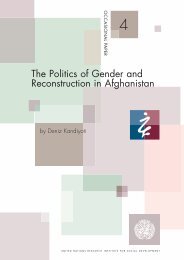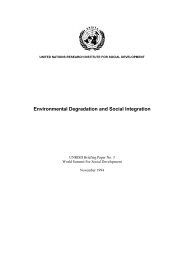Women's Employment - United Nations Research Institute for Social ...
Women's Employment - United Nations Research Institute for Social ...
Women's Employment - United Nations Research Institute for Social ...
Create successful ePaper yourself
Turn your PDF publications into a flip-book with our unique Google optimized e-Paper software.
Trade unions, gender issues and the ready-made garment industry of Bangladesh<br />
interests rather than pursuing the interests of the female garment<br />
workers and their unit unions.<br />
Some garment factory owners have labelled some federation<br />
leaders as “trade unionist brokers” who “milk” both sides — the RMG<br />
workers and/or their unit unions and the owners — in the name of<br />
solving industrial disputes. According to them, in times of industrial<br />
conflicts, some of these federation leaders take money from the owners<br />
to “buy off” the prospective male troublemakers among the garment<br />
workers (interestingly, most of the owners have confessed to the<br />
author that it is much easier to bribe a male leader than a female one).<br />
At the same time, they also try to squeeze money from mostly female<br />
workers by promising them protection from harassment from<br />
members of the law en<strong>for</strong>cing agencies or the hired musclemen of the<br />
owner.<br />
Although some of our respondent federations reported that they<br />
try to educate female garment workers and their unit union leaders<br />
regarding their legal rights and obligations through various<br />
workshops, group discussions and other means, during our survey<br />
we observed only non-registered Federation G to be conducting<br />
weekly classes on various legal, social, and other issues related to<br />
female workers. The leaders of this federation, however, confessed<br />
that they often encountered difficulties in getting enough female<br />
garment workers to participate in the courses.<br />
k. Formation of the unit unions<br />
Unit unions in the RMG sector in Bangladesh are <strong>for</strong>med in two<br />
ways. One, the federations try to <strong>for</strong>m unions in as many factory units<br />
as they can, so that, as umbrella bodies of various unit unions, they<br />
can emerge as legitimate bargaining agents in this specific area of the<br />
private sector. In this process, the federation leaders themselves<br />
organize the workers in various units, secretly obtaining the signatures<br />
of 30 per cent of workers interested in joining unit unions and doing<br />
all the necessary legwork (including, they claim, bribing the officials<br />
at the office of the Registrar of Trade Unions). Unit unions can also be<br />
<strong>for</strong>med subsequent to the involvement of federations in non-unionized<br />
labour disputes: <strong>for</strong> instance, when workers of a factory face problems<br />
such as delay in payment of wages and overtime benefits, scrapping<br />
of holidays, or deterioration of the factory environment, they come to<br />
the federations <strong>for</strong> assistance. The federations then provide various<br />
kinds of assistance, such as organizing demonstrations and moving<br />
the matter to relevant labour courts and so on. Thereafter, they slowly<br />
explore the possibility of <strong>for</strong>ming unit unions in the factory, and then<br />
197




